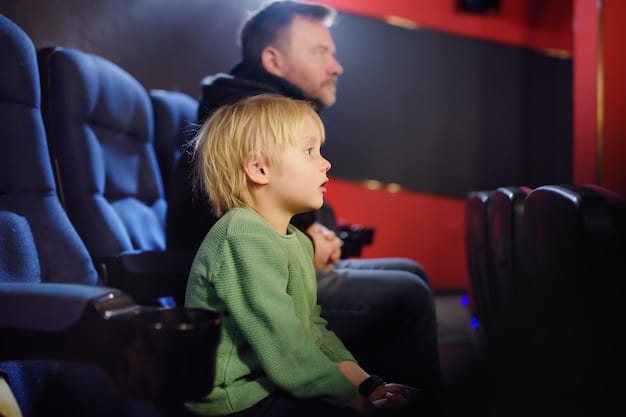Impact of 10% Ticket Price Hike on US Moviegoers

A 10% increase in movie ticket prices in the US is expected to influence moviegoing habits, potentially leading to decreased attendance, a shift towards streaming services, and increased interest in discount options.
The cinematic experience is a cherished pastime for many, but what happens when the cost of admission goes up? A 10% increase in ticket prices in the US could significantly alter how Americans choose to enjoy movies, prompting shifts in behavior and preferences. Let’s explore the potential consequences of this price hike.
Analyzing the Immediate Impact of Increased Ticket Prices
An increase in ticket prices, by any margin, inevitably has an initial effect on consumer behavior. Understanding the immediate reactions to this change is crucial for theaters and moviegoers alike.
Here, we examine the possible short-term impacts and how they might set the stage for long-term trends in movie consumption.
Initial Drop in Attendance
The most direct consequence of higher ticket prices is often a decrease in attendance. People may be less inclined to visit the cinema as frequently, especially those on tighter budgets.
Increased Scrutiny of Movie Choices
When each visit to the theater becomes more expensive, moviegoers tend to be more selective. They’ll likely rely more on reviews, trailers, and word-of-mouth to ensure their chosen film is worth the higher cost.
- Fewer Impulse Visits: Spontaneous trips to the movies may decline.
- Heightened Expectations: Moviegoers expect a higher-quality cinematic experience.
- Greater Reliance on Reviews: Decisions are more informed and less impulsive.
In short, the immediate impact involves a more cautious and value-driven approach to moviegoing.

Shifting Preferences: Blockbusters vs. Independent Films
Price hikes can influence the types of movies people choose to watch in theaters. Consumers may feel the need to maximize the value of each visit, potentially favoring blockbuster films.
Let’s delve into how the balance between big-budget spectacles and smaller, independent productions might shift.
The Allure of Blockbusters
Blockbusters, with their extensive marketing, high production values, and immersive experiences, may seem like the most worthwhile option when tickets are costly. These films promise a grand spectacle that feels justifying the expense.
Challenges for Independent Films
Independent films, which often rely on smaller budgets and niche audiences, may struggle to compete. Moviegoers may be less willing to take a chance on an unknown quantity when their spending is constrained.
- Blockbusters Dominate Screens: Theaters prioritize showings of high-grossing films.
- Limited Exposure for Indies: Independent films receive less marketing and fewer screenings.
- Niche Audiences Impacted: Those who prefer independent films may reduce their theater visits.
The changing landscape could make it tougher for independent filmmakers to reach their audience, further consolidating the dominance of major studios.
The Rise of Alternative Viewing Habits
Faced with rising ticket prices, many consumers may turn to alternative ways of watching movies. Streaming services, home theaters, and discount options become more attractive.
Here’s a look at how these alternatives could reshape moviegoing habits.
The Streaming Surge
Streaming services offer a vast library of content for a relatively low monthly fee. This becomes an increasingly appealing alternative to the high cost of individual movie tickets. Many may switch to watching new releases and classic films from the comfort of their homes.
Investing in Home Theaters
Some consumers might invest in better home theater setups, including larger TVs, enhanced sound systems, and comfortable seating. This allows them to replicate the cinema experience at home, albeit with a higher upfront cost.
The availability of high-quality streaming content and affordable home theater technology makes staying in a more attractive option than ever before.

Discount Days and Loyalty Programs
In response to declining attendance due to price increases, theaters may ramp up their offers of discount days and loyalty programs. These initiatives aim to entice moviegoers back by providing more affordable options.
Let’s explore some of these strategies and their potential effectiveness.
The Appeal of Discount Tuesdays
Many theaters offer discounted tickets on specific days, such as Tuesdays. These promotions can be highly effective in drawing crowds, particularly for those who are price-sensitive.
Rewarding Loyalty
Loyalty programs that offer points, free tickets, or discounts based on spending can encourage repeat visits. These programs create a sense of value for frequent moviegoers.
- Targeted Promotions: Tailored offers for specific demographics or movie genres.
- Subscription Models: Monthly passes for unlimited or discounted movies.
- Partnerships: Collaborations with other businesses to offer bundled deals.
Successfully implemented, these strategies can help mitigate the negative effects of higher ticket prices and sustain attendance.
Long-Term Effects on the Movie Industry
The long-term effects of a 10% increase in ticket prices could extend beyond mere changes in attendance. Production budgets, distribution strategies, and the overall cinematic landscape may all undergo significant shifts.
Here’s how the industry might adapt to these changes.
Budget Adjustments
Studios may need to reassess their production budgets, focusing on projects that are more likely to draw large audiences. This could lead to fewer mid-budget films and a greater emphasis on guaranteed successes.
Innovation in Distribution
Theaters might explore innovative distribution models, such as shorter theatrical windows or simultaneous releases on streaming platforms. These strategies aim to maximize revenue and cater to changing consumer preferences.
Over time, the movie industry will likely evolve to balance profitability and accessibility in a world where consumer choices are increasingly diverse.
Strategies for Theaters to Combat the Price Hike Impact
Theaters need to adopt proactive strategies to counteract the potential negative impacts of higher ticket prices. Enhancing the moviegoing experience, improving customer service, and leveraging technology can all play a role.
Let’s see the effective techniques theaters can employ to retain and attract audiences.
Enhancing the Moviegoing Experience
Investing in superior seating, high-quality sound and visual systems, and premium food and beverage options can create a more attractive and immersive experience. These improvements justify the higher cost of admission.
Leveraging Technology
Mobile ticketing, interactive displays, and personalized recommendations can enhance convenience and engagement. These technologies cater to modern consumers who expect seamless and intuitive experiences.
- Improved Customer Service: Training staff to provide exceptional service.
- Community Engagement: Hosting events, screenings, and Q&A sessions.
- Creating a Destination: Making the theater a social and entertainment hub.
By focusing on these areas, theaters can build loyalty and remain a relevant and appealing option for moviegoers.
| Key Aspect | Brief Description |
|---|---|
| 📉 Attendance Drop | Initial decline in moviegoers due to higher ticket costs. |
| 🎬 Blockbuster Preference | More focus on big-budget films to justify ticket price. |
| 🏠 Streaming Growth | Increased shift to streaming services as a cheaper alternative. |
| 🎁 Loyalty Programs | Theaters increasing discounts to retain customers. |
Frequently Asked Questions
▼
A 10% increase could lead to a noticeable drop in attendance, particularly among price-sensitive moviegoers, as some people may find the cost of going to the movies too high and opt for cheaper alternatives.
▼
While everyone will feel the increase, lower-income individuals and families might be more significantly affected. They may reduce their visits or seek out discounts and special offers to make it more affordable.
▼
Yes, theaters can offer loyalty programs, discount days, and enhanced experiences like premium seating and better food options to retain customers and encourage frequent visits despite the higher prices.
▼
Independent films might struggle as moviegoers prioritize big-budget blockbusters for their theater visits. This could lead to reduced screenings and lower revenues for indie films, which rely on smaller audiences.
▼
Yes, streaming services are likely to benefit as consumers seek more affordable entertainment options. The convenience and lower cost of streaming make it an attractive alternative to going to the cinema.
Conclusion
In conclusion, a 10% increase in ticket prices in the US is poised to reshape moviegoing habits. While the immediate impact may involve reduced attendance and a shift toward blockbusters, long-term effects could spur innovation in distribution and enhance the moviegoing experience. Theaters and studios alike will need to adapt to these changes to remain competitive and cater to evolving consumer preferences.





